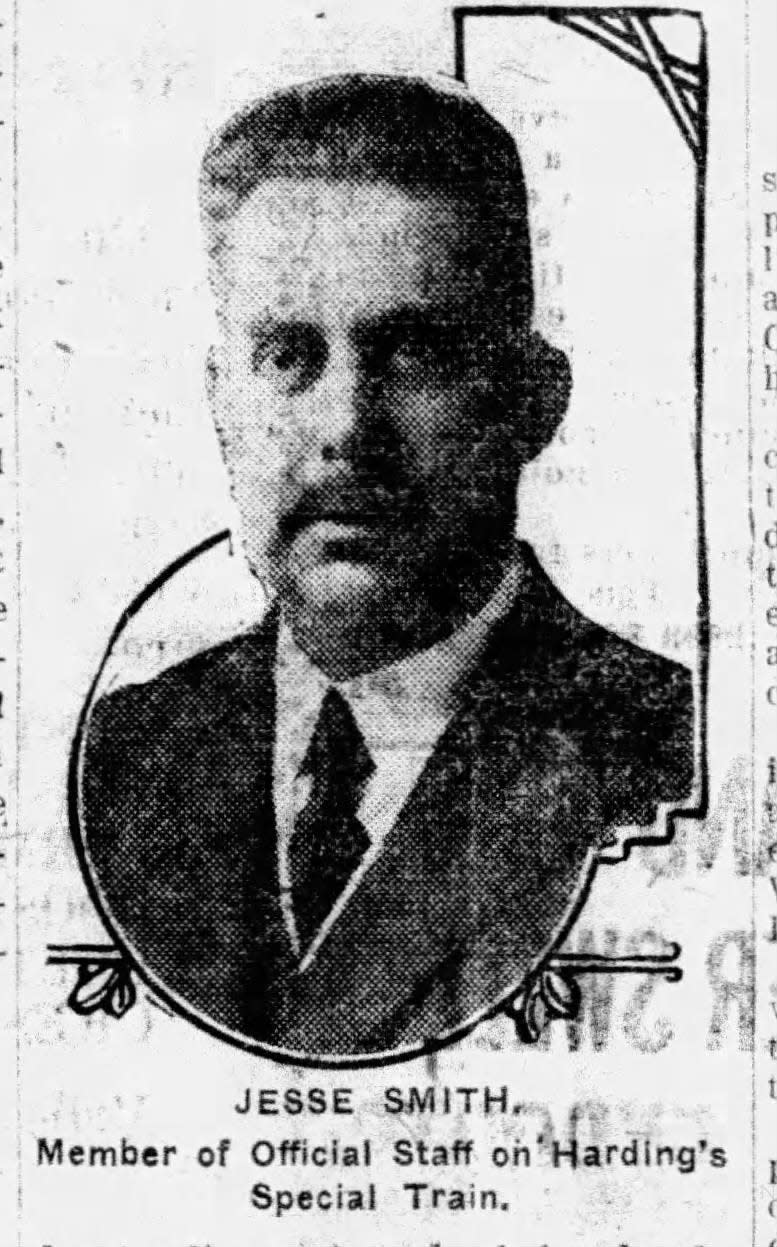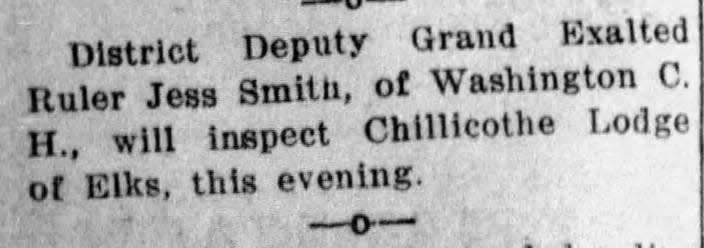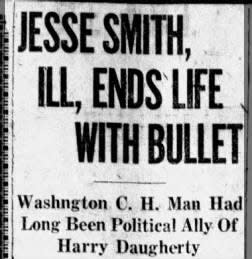Looking Back: When Jesse Smith worked close to the presidency
On Memorial Day, May 30, 1923, a loud sound came from a sixth-floor suite early in the morning at the prestigious Wardman Park Hotel in Washington, D.C. A witness would later say he thought it was a door slamming. It wasn’t.
Inside the bedroom of the luxury suite, a 50-year-old man dressed in purple silk pajamas lay crumpled at the foot of a bed. A .32 caliber pistol in his right hand, his head stuffed inside a metal wastebasket on top of ashes of burned papers was the body of Jesse Smith of Washington Court House, with a gunshot to the right temple.
His suicide was the result of his misconduct in just one of the many scandals enveloping the administration of President Warren G. Harding of Ohio. Chillicotheans knew Smith well and his death had many in the city shaking their heads in disbelief.
Jesse W. Smith was born in 1872 in Washington Court House and grew up there. His father died when he was a young boy and, Harry Daugherty, 12 years his senior, took him under his wing and the two formed an unbreakable bond.
Daugherty was a father figure to Smith and helped him open a department store in Washington Court House. The store was a success and Chillicotheans often made the trip to shop there. Some residents even relocated to the neighboring city and worked at Smith’s store.

In 1908, Smith married a beautiful, talented, intelligent woman named Roxy Stinson, who lived with her mother on the second floor of the store. Smith’s marriage to the redhead bombshell did not last long, but they would remain friends for the rest of Smith’s life.
Most Chillicotheans knew Smith, however, as a result of his activities in Ohio’s Elks fraternal organization. Smith rose through the ranks of the lodge, eventually becoming District Deputy Grand Exalted Ruler. One of his responsibilities was inspecting local lodges and he often visited the city to inspect Chillicothe’s Lodge #52 on 2nd Street.
More significantly, he served as Ohio’s Elks president from 1917-1918, just as America joined the war in Europe and Camp Sherman was built to the north of the city. He used his influence and secured appropriations to build a 60-room recreation building for soldiers and received much praise locally for doing so.

At the same time Smith was making a name for himself, Harry Daugherty became a hot shot lawyer, elected councilman in Columbus, prosecuting attorney in Fayette County and representative in the state legislature. He gained a reputation as a cunning, ruthless political operator, willing to lie and cheat without conscience to get what he wanted. No one trusted him, especially voters and he lost elections for Congress, the Senate and in a bid to be Ohio governor.
Despite not being trusted by voters and other politicians, Daugherty somehow formed a friendship with Harding during these years. When then Senator Harding decided to run for president in 1920, Daugherty acted as his campaign manager and was instrumental in him winning the nomination and subsequent election.

Harding rewarded Daugherty for his loyalty and political skills by appointing him United States attorney general, despite being warned against it time and again. The New York Times editorial page, in just one example, advised that “If Mr. Harding has any close and trusted advisors who are not afraid to tell him the truth, even if it be unwelcome, they ought to lay before him in the plainest way the blunder he would make if he chose Mr. Daugherty as his Attorney General.”
The criticism, especially from the press, had the opposite effect on Harding and he was more determined than ever to appoint his friend.
Smith, who had been active in the presidential campaign as well and served on the inaugural committee, followed Daugherty to Washington and the new attorney general gave him an office close to his, but Smith was never an official government employee or on the payroll. The two men lived together in a house on H Street, and as one historian has written, Smith acted as Daugherty’s “valet, private secretary, gofer, bookkeeper, and roommate.” Smith loved and worshipped Daugherty.

It was Smith’s activities, however, at the “Little Green House on K Street,” where corrupt deals were made that tarnished the Harding presidency, that was his undoing. It was there that Smith and Daugherty handed out jobs to friends, many considered unqualified. They became collectively known as “The Ohio Gang.”
Prohibition was in full effect, but alcohol flowed at the three-story green house. The president was a frequent guest at poker parties, smoking cigars and drinking illegal liquor. In this atmosphere, Smith became self-important and began making deals to sell government liquor stored in warehouses to bootleggers, arrange pardons, and other schemes that made him lots of money.
Smith’s activities, many surely at the behest of Daugherty, although it was never proven, got increasingly out of control and his dealings came under close scrutiny and he was allegedly about to be arrested. Before that happened, Harding called Daugherty to the White House and told his attorney general to get Smith out of Washington.
It was after Daugherty broke the news to Smith that he entered his bedroom at the Wardman Hotel, burned all of his and Daugherty’s personal papers, and shot himself in the head. At the time, the suicide was blamed on poor health, and his body was rushed back to Washington Court House and buried.
Roxy Stinson, Smith’s ex-wife who was privy to many of her former husband’s backroom dealings, insisted that he was murdered because of all he knew about the corrupt dealings of the Harding administration.
The president sent flowers to Smith’s funeral in Washington Court House, but the scandals were just beginning. Harding would be dead himself a few months later, and there would be more accusations of foul play, also with little evidence. Daugherty was immediately dismissed by Harding’s successor, Calvin Coolidge.
This article originally appeared on Chillicothe Gazette: Looking Back: When Jesse Smith worked close to the presidency

